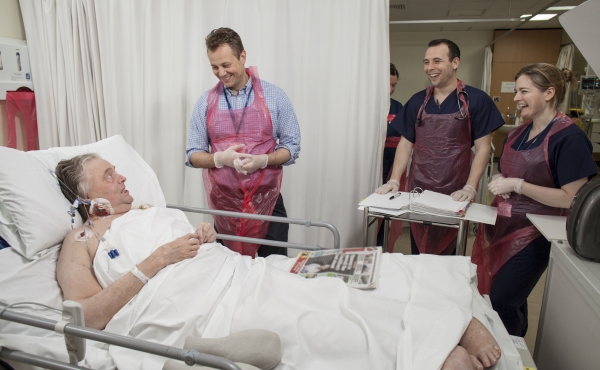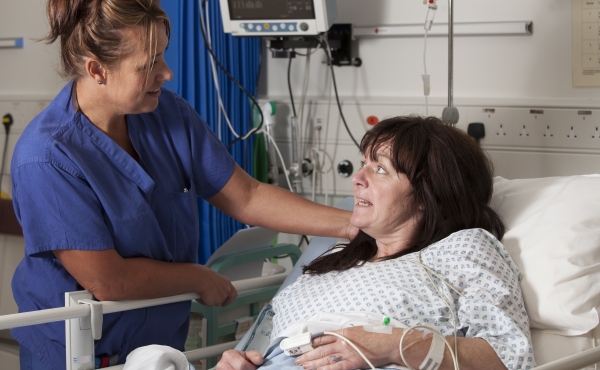Shared Decision Making and OSIRIS

Ramai Santhirapala is a Consultant Anaesthetist and Perioperative Medicine Lead at Guy’s and St Thomas’ NHS Foundation Trust, London, and the Clinical Lead for the UK arm of the international 'Choosing Wisely' programme in shared decision-making, led by the Academy of Medical Royal Colleges.

Rupert Pearse is the Director of the UK Perioperative Medicine Clinical Trials Network and an active researcher in perioperative medicine, with experience of leading several international projects to completion as chief investigator. He has a major interest in perioperative medicine, but is active in various fields in intensive care medicine and anaesthesia.
Shared decision making is now a key concept for every aspect of perioperative care. There is a worldwide focus on this approach to treatment decisions, which is already a legal standard in the UK. One in three high-risk patients choosing surgery will experience serious medical complications leading to long-term decline in health and quality of life.
Awareness of these long-term risks is poor among both doctors and patients. Consequently, many high-risk patients do not receive the information they need to make an informed decision about surgery. Shared decision making is a collaborative process between clinicians and patients, which aims to select the most suitable treatment option based on both best available evidence and informed patient preferences.
The concept of shared decision making has been cited for decades since the US president’s Commission for the Study of Ethical Problems in Medicine and Biomedical and Behavioral Research in 1982.1 However, adoption into clinical practice has been slow, particularly in perioperative care. A systematic review of decision making in surgery, published last year, concluded that surgeons were more likely to perceive the consultation process as a shared decision than patients were, but this evidence base remains sparse. 2 Shared decision making is an iterative process which starts from the moment of contemplation of surgery. As the role of many anaesthetists extends further across the perioperative period, this will include the decision-making process.3
The benefits of shared decision making are widely recognised outside perioperative care. Patients who are effectively involved in making decisions about their care have fewer regrets about treatment, better reported communication with clinicians, improved treatment adherence, and an overall better experience with improved satisfaction. Within the UK there exists national policy on shared decision-making, with recent guidance from NHS England, the National Institute for Health and Care Excellence and the Academy of Medical Royal Colleges (AoMRC). Shared decision-making is also mentioned in international policy, such as that of the Commonwealth Fund, and is a prominent theme in the international initiative ‘Choosing Wisely’.4
However, the challenge remains of how to implement shared decision making, and this will be a focus of two Centre for Perioperative Care (CPOC) themes – supporting patients and research and innovation. CPOC will bring together best evidence in these areas to create implementation tools for shared decision making in perioperative care, supported by ‘Choosing Wisely UK’ led by the AoMRC and the ‘Optimising shared decision making for high-risk major surgery’ (OSIRIS) research programme led by Queen Mary University of London. ‘Choosing Wisely UK’ will focus on improving professional perceptions of shared decision-making through education and training alongside supporting patients through the promotion of four questions which explore ‘Benefits, Risks, Alternatives and doing Nothing’ (BRAN), with a pilot planned at Guy’s and St Thomas’ NHS Foundation Trust.5
OSIRIS is a National Institute of Health Research (NIHR) funded programme which aims to explore perceptions of both patients and professionals to inform the development of specific tools to support shared decision-making. The ultimate output from OSIRIS will be a targeted intervention which solves the key challenges in the implementation of shared decision-making. CPOC is therefore playing a central role in building collaborative networks worldwide to support optimal shared decision-making for patients in the perioperative period.
References
- Making healthcare decisions: a report on the ethical and legal implications of informed consent in the patient-practitioner relationship. President’s Commission for the Study of Ethical Problems in Medicine and Biomedical and Behavioral Research, Washington DC 1982.
- de Mik SML et al. Systematic review of shared decision-making in surgery. Br J Surg 2018;105(13):1721-1730.
- Stugress J, Clapp JT, Fleisher LA. Shared decision-making in peri-operative medicine: a narrative review. Anaesthesia 2018;74 (Supp 1):13-19.
- Ross J et al. Helping Patients Choose Wisely. BMJ 2018;361:k2585.
- Santhirapala R, Fleisher LA, Grocott MG. Choosing Wisely: just because we can, does it mean we should? BJA 2019;122(3):306–310.




